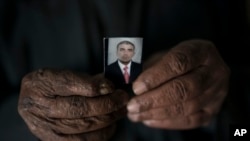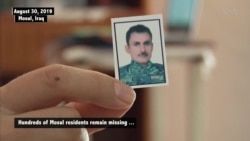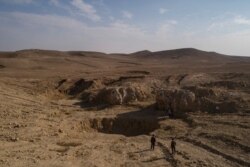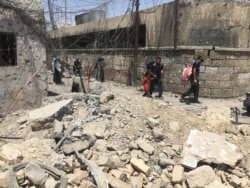As the world marks the International Day of Missing Persons, hundreds of Mosul families remain in agony over the whereabouts of their loved ones who went missing during the war against Islamic State (IS).
Local officials say about 4,000 Mosul residents, mainly men and teenage boys, are still unaccounted for, more than two years after IS removal from the city. Many are feared dead, buried in hundreds of unexcavated mass graves across the country.
For families who are waiting to hear news about their missing loved ones, the government bureaucracy and inefficiency is slowly dimming their hopes.
Sharifa Muhammad, 55, has not heard about her 25-year-old son Ahmad Khalil since September 2016, less than a month before the Iraqi forces announced their operation to oust IS from Mosul. A soccer player during IS control, Khalil went missing after attempting to escape Mosul to Baghdad.
"We don't know who kidnapped him and took him. We still haven't received a single information about him," she told VOA, expressing frustration about how local officials were handling the search. "I visited the Provincial Council [of Mosul] a lot and submitted requests. But there is nothing. Absolutely nothing."
Basima Salih, another Mosul resident who is in limbo over the fate of her two sons, said she believes the government forces took her sons from an IS prison after capturing the city in July 2017. The two brothers, Saad and Mohamad Hazim Ghanim, were police officers before IS took over. The jihadist group later arrested them on charges of conspiring with the Iraqi forces.
"After the government freed us, it took them and released their pictures. In the picture, Mohamad was at the back and Saad was at the front. They looked thin and they were wearing thobes. There was also a solider behind them," Salih told VOA, holding a picture allegedly from the Iraqi forces that showed her two sons among several other men.
"I call on the the government: You freed us and captured IS prisons. Where are our sons? We want them back. They have children. They have hurt no one," Salih said.
Mosul is Iraq's second-largest city with a population of more than 1 million that stayed under IS's grip for three years. Then-Iraqi Prime Minister Haider al-Abadi officially declared victory in the city July 10, 2017. The jihadist group has since lost control of all territories it once considered part of its self-proclaimed caliphate in Iraq and eastern Syria.
Two years after the military operation, local and international organizations say large parts of the city remain damaged and residents continue to suffer from the aftermath of the conflict.
According to the International Committee of the Red Cross (ICRC), Iraq has one of the highest numbers of missing people in the world because of decades of conflict and violence.
During a joint gathering on Thursday held in Baghdad with the Iraqi government to mark the International Day of Missing Persons, ICRC said it had helped find out the fate of more than 1,500 missing Iraqis since early 2018. But it recognized more needs to be done to expedite the search and support relatives.
"We see firsthand the heartbreaking emotional aftermath of a missing parent or child. Families never cease their anxious search for information," said Katharina Ritz, head of delegation in Iraq for the ICRC.
The office of Iraq's prime minister in a statement at the joint appearance said the Iraqi government had done its best to investigate the cases and it "will spare no effort to continue to look into the fate and whereabouts of these missing persons and to bring hope and support to their families."








